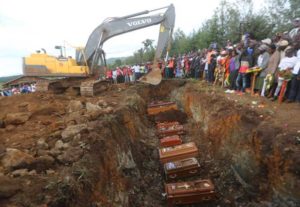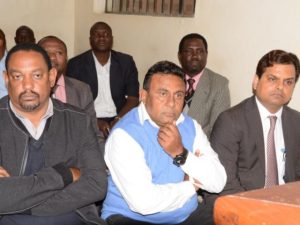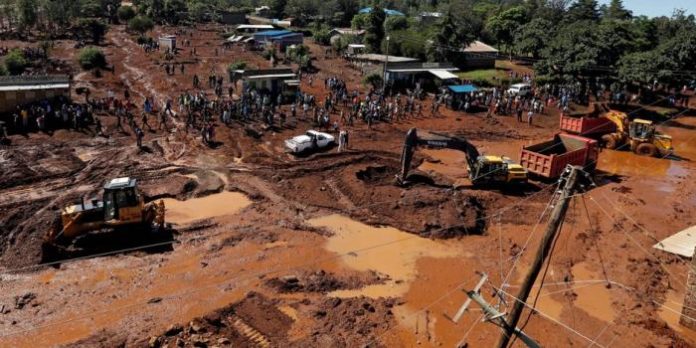By Winnie Kamau
Despite a directive issued by Cabinet Secretary in the Ministry of Water and Sanitation, Simon Chelugui in May to drain the rest of the Dams in Solai Patel Farm has not been adhered to, even after the Solai Tragedy saw 47 lives lost.
This comes hot on the heels of a damning 70-page report by three Human Rights Lobby groups, Kenya Human Rights Commission (KHRC), Freedom of Information
Network and Mid Rift Human Rights Network who are expressing grave concerns over the Dams that are still in operation at the farm.
The Report dubbed Damned Dams in their recommendations have shown that Water from 2 drained Patel dams are currently flooding people’s homes and farms creating more victims in the process.

The report sheds light on the man-made disaster that happened in Solai village highlighting the causes of the tragedy which revolve around allegations of corporate impunity and the failure of government agencies to take appropriate action to avert the tragedy.
The Patel Farm has been reserving water from 8 Dams before the bursting of the tragic Dam which contained 190 million liters of water that gushed out killing 47 and over 5,000 people were displaced in its wake.
According to the report, for the last forty years, the presence of the dams on the estate have diverted natural sources of water and this general conduct of the company has been the subject of public and policy discussions.
The dams are fed by water from rivers that have been diverted to the farm mainly for dairy farming, nurturing of coffee bushes and macadamia trees as well as the production of flowers for the export market.
The first concern was raised in 1980 by the then Member of Parliament for Subukia, Koigi Wa Wamwere but nonchalant efforts were taken by the then Government.
Who is Patel?
Mr. Shantilal Nathalal Patel is said to have arrived in Solai from India in 1930 with the colonial settlers where he started off as a manufacturer of Indian sweets and went on to set up a small shop where he sold farm produce to the settlers on a small scale as the farms were exclusively owned by white settlers.
Patel, later went on to buy Lorries and began transporting milk for all the dairy farmers to the creameries. After independence, he bought his first land estate from a settler who was known to the locals as Kayunga.

The former Kamungi farm is what is now called the Patel coffee estate and houses the biggest of the dams known as Tindress dam which. This dam since the tragedy has been drained of water in an initiative by the government to empty dams in the farm found to be structurally unsound and potentially risky to neighboring communities.
Patel then went on to buy another farm named Ottoman estate from a settler by the name Mercantile. He would later acquire the third farm from Endao Farmers’ Cooperative which was a section of the cooperative’s land, this was to ensure that there was a break of ownership between the Kamungi estate and the Ottoman estate.
Much later, Patel bought the Milmet estate from a settler by the name Jack. The Patel estate is, therefore, a combination of four estates previously owned by white settlers and which is watered by 8 dams.
In the 1980s, Patel sold part of his Ottoman estate to the locals. This settled over 600 households on what would later be known as the Nyakinyua settlement but due to leadership wrangles, the inhabitants only hold certificates of ownership of shares commonly referred to as share certificates.
The Solai Group of Companies
According to the report, the Solai Group of Companies is said to have operations in 14 countries including India and the United Kingdom. The Patel family also owns the Malindi-based Kensalt, Africa’s largest producer of salt with an estimated annual output of 1 million tonnes.
Kensalt controls 75% of the salt market in Kenya with a further 50% control of the salt market, in Uganda. The dam that burst was located in what was previously Milmet Estate which was acquired from Jack.
At the time that this fact-finding mission was conducted, it emerged that the dams on the vast Patel Estate had blocked one river and 3 streams with Tindress dam blocking river Kabaazi which flows into Lake Baringo.
While Ottoman dam had blocked a stream that would flow down into the Nyakinyua settlement scheme and Milmet dam had blocked a stream that would flow through Endao settlement farm.
Corporate Capture and Labour Violations by Patel Coffee Estates
The report reveals how the Patel capture through providing employment for thousands of residents has led them to look the other way. Many who were affected were worried about speaking out for fear of loss of their jobs hence branding of Patel as a Philanthropist.
The local administration confirms that the Patels have a firm grip on institutions including the local police stations and also take charge of development initiatives that are primarily the responsibility of the government. This perhaps explains the reluctance by authorities to hold the company owners to account for the senseless deaths visited upon the people of Solai.
Among the recommendations by the report include an institution of criminal charges against NEMA, WRA, Registrar of Companies, the local level administrators, police officers and other public officers.
Also, criminal charges against Patel Coffee Estates Ltd for criminal liability have been recommended.
An urgent finalization of the DNA testing process of one deceased child whose body at the mortuary had been claimed by two different families should be
undertaken so as to bring closure to her family.
The directive by CS Chelugui, was issued during a visit with the affected families as he acknowledged that Patel was illegally operating the 8 Dams on his farm.














